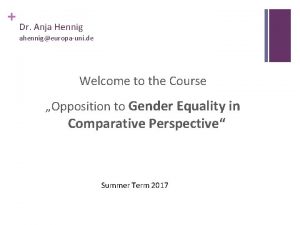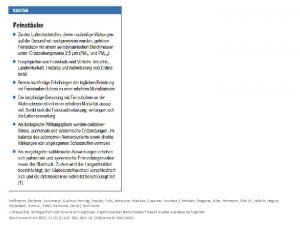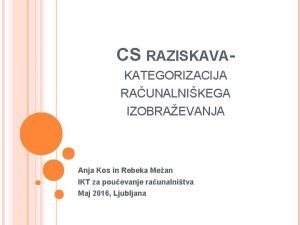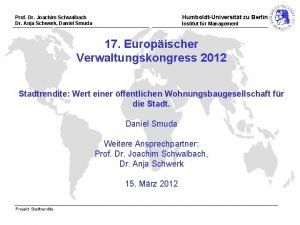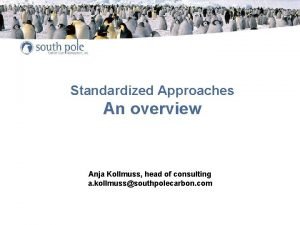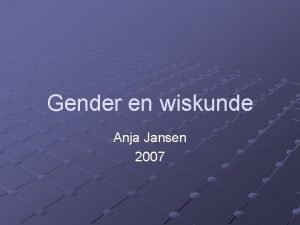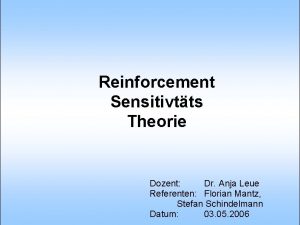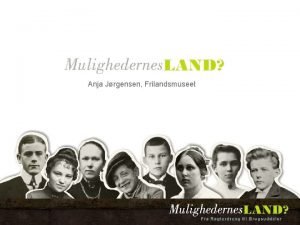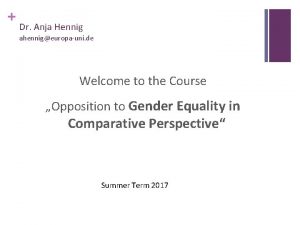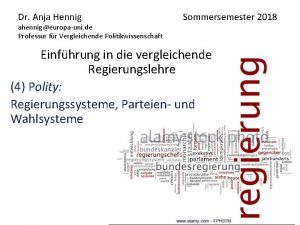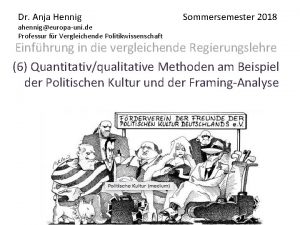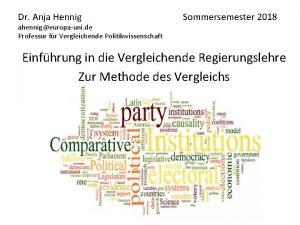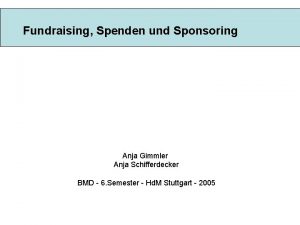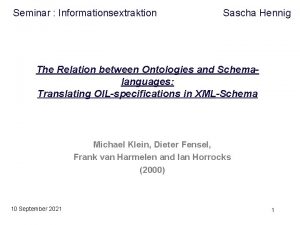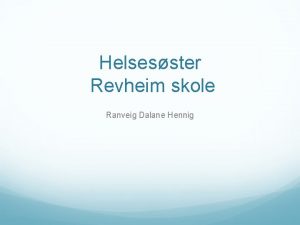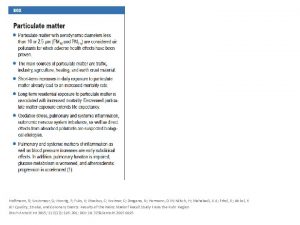Dr Anja Hennig ahennigeuropauni de Welcome to the




















- Slides: 20

+ Dr. Anja Hennig ahennig@europa-uni. de Welcome to the Course „Opposition to Gender Equality in Comparative Perspective“ Summer Term 2017

+ 18 April 2017 GETTING STARTED…

+ Today´s programme Course organization: 1. 1. 2. 3. Who we are Input presentation “Gender Studies”? “Wish list” 2. Your definitions and questions 3. Introduction into comparative research 4. Course requirements 5. Next session

+ Gender Equality? ? ? ME AN GE ING O ND ER F ? n No difference between “gender” n Same rights for men and women n Same opportunities for men and women: labor market! n Same responsibilities in raising children n Right to chose one´s way of life n Guaranteeing equal rights for men and women n POLITICAL Equal treatment regardless of “gender” n No discrimination against any gender (men, women, homosexuals…) n Abolition of sexist or gender specific social norms (dress code, (family) responsibilities n Attempt to remove social barriers that may cause inequalities n GE not achieved yet, despite struggle for same rights n NORM ME AN EQ ING UA LIT OF Y? ACTION GOAL An ideal field without discrimination and extremisms

+ Your questions Reasons for inequalities Women´s place/women´s faith in society Gender Mainstreaming – How effective? Reactions to „Gender Equality“ • Catholic actors • Right-wing actors • LGBT/women WHY OPPOSITION? WHY APPROPRIATION? WHICH STRATEGIES? WHICH ARGUMENTS?

+ Academia: Conceptualizing Gender EU GENDER EQUALITY UN National Policies Anti-discrimnation program Sexuality education etc. >> RE/ACTIONS<< in society and politics Religious Actors Political Actors

4. Aims of the course + n Overview about EU gender equality politics n Overview populism, religion and gender n Doing empirical social science research and comparison n Learn about related concepts and ideas as means to better understand/explain this phenomenon n n Gender as academic term Gender equality as political aim Persistence/defense of traditional gender roles Different actors and ideologies supporting traditionalism Research in a collaborative setting: n n n Group discussions, team work Developing research questions Researching case studies Applying theoretical arguments Learning to apply a comparative perspective

+ Doing Comparative Research 1. Why do we compare? a) Daily life: myself – others => identity, orientation, evaluation b) Scientific method to analyze diversity “Comparative researchers examine pattern of SIMILARITIES and DIFFERENCES across cases and thy to come to terms with their diversity (Charles Ragin 1986, 107). ” n Cases = defined research objects, e. g. democratic or authoritarian regimes, conflict about abortion in different countries…

+ Doing Comparative Research 1. Why do we compare? n Empirical description: n n Classification n n Organizing diversity based on criteria (e. g. Church-state-regime) Theory Building => Comparative method n n Identifying similarities, particularities, differences Explaining similarities & differences with causal models (e. g. Catholic tradition and abortion policy) Prediction n Results adoptable to other cases?

+ Doing Comparative Research 2. How to compare? n Method depends on the aim of comparison + research question n Empirical description to explore diversity: n Comparing apples and oranges…? Comparing apples…? n … Criteria! (similar: fruits, different: taste, content of juice…) = 1 st step before… n …building typologies (how do abortion laws differ in x, y, z? ) n …explaining differences (why do abortion laws differ x, y, z? )

+ Group Work Please discuss how you would compare case-studies about forms of opposition to gender/gender equality, e. g. : n Questions and aims? n Criteria? n Country selection? SAVE YOUR RESULTS!

+ Course requirements >> 3 ECTS (BA/MA) Regular and active participation in online- and classroom discussions Regular text reading related tasks Protocol (up to 3 pages) of one session (90 min. ) and short presentation at beginning of next session (see handout)

+ Course requirements >> 6 ECTS Regular and active participation in online- and classroom discussions Regular text-reading and related task Presentation (In-put or country-report) PLUS: BA: Shorter written exam or research proposal (see handout) MA: Advanced research proposal (8 -10 p. ) OR written commentary on 2 -3 research proposals from your colleagues, possible only after the end of the course

+ Course requirements >> 9 ECTS Regular and active participation in online- and classroom discussions Regular text-reading and related tasks Presentation (Input or country-report) PLUS: BA: Final exam or term paper that related to the topic of presentation MA: Short research proposal (1 -3 p. ) and term paper (2025 p. ) that relates to the topic of presentation, participation at final colloquium end of last week of semester

+ 6. About Country Reports n n Aim: n Students do in-depth research in a selected country about local/regional/national resistance against gender/gender equality policies n Comparison of reports in groups n PPT-Presentation of reports in comparison n Reports as point of departure for your research proposal or term paper Your preparation and deadlines: n You select one or two countries (language skills? !) n LATEST DEADLINE 16 May – Group formation n Check cross-country reports available in moodle (last box) n Search for further sources and information n Discuss and structure findings in your group All are involved! n n Which questions are relevant to ask? n Which hypotheses can be generated from the readings and discussions?

+ 6. About in-put presentations n Aims: n You add a related aspect to the main topic of the course that is unfamiliar to your colleagues n Preparation: n n n You select your topic as early as possible (first and second choice) Deadline 2 May 2017 (apart from presentation on gender mainstreaming that day) Reading in moodle, own research not mandatory but possible Prepare a 1 -page handout Presentation (alone or as a team): n Max. 20 minutes n Start with a guiding question n Summary of main points End with 1 -2 discussion questions AND one question for the country reports

+ RELEVANT DATES AND DEADLINES AT A GLANCE: n 2 MAY 2017: SELECTION OF IN-PUT PRESENTATIONS n 16 MAY 2017: SELECTION OF COUNTRY REPORTS AND WORKING GROUP FORMATION n 7/14/21 JUNE (WED): CONSULTATION WITH COUNTRYREPORT GROUPS n 4 JULY 2017: EXAM PREPARATION n 20 JULY, 12 a. m: SUBMISSION OF RESEARCH PROPOSALS FOR KOLLOQUIUM n 21 JULY 2017, ABOUT 9: 30: EXAM (FOR BA´S) - KOLLOQUIUM FOR RESEARCH PROPOSAL AND TERM-PAPER WRITERS

+ 7. Class rules “online” n Regular access to the course in moodle is essential as this site contains al deadlines, tasks and new information! Don´t upload all texts at once! n Please use your euv-mail in order to keep in touch with moodle and to get all forum information! n Please note that documents sometime may be longer than required reading. Check reading advices!

+ 7. Class rules "offline": n Please no open laptops or mobile phone activities during class!!! You can use your laptop for research as part of the group-work. n Consultation for presenters until latest o n e week before presentation is mandatory You as presenter (also groups) are familiar with the required reading and n Have send me a written document with your ideas a day before n

+ Next session 2: 15 -5: 15 PART 1 Terms and Concepts ********** “Gender” – Evolution and Meanings of a Multifaceted Concept n What does "gender" mean? To what extent can this question be easily answered? n Input Presentation “What are Gender Studies”?
